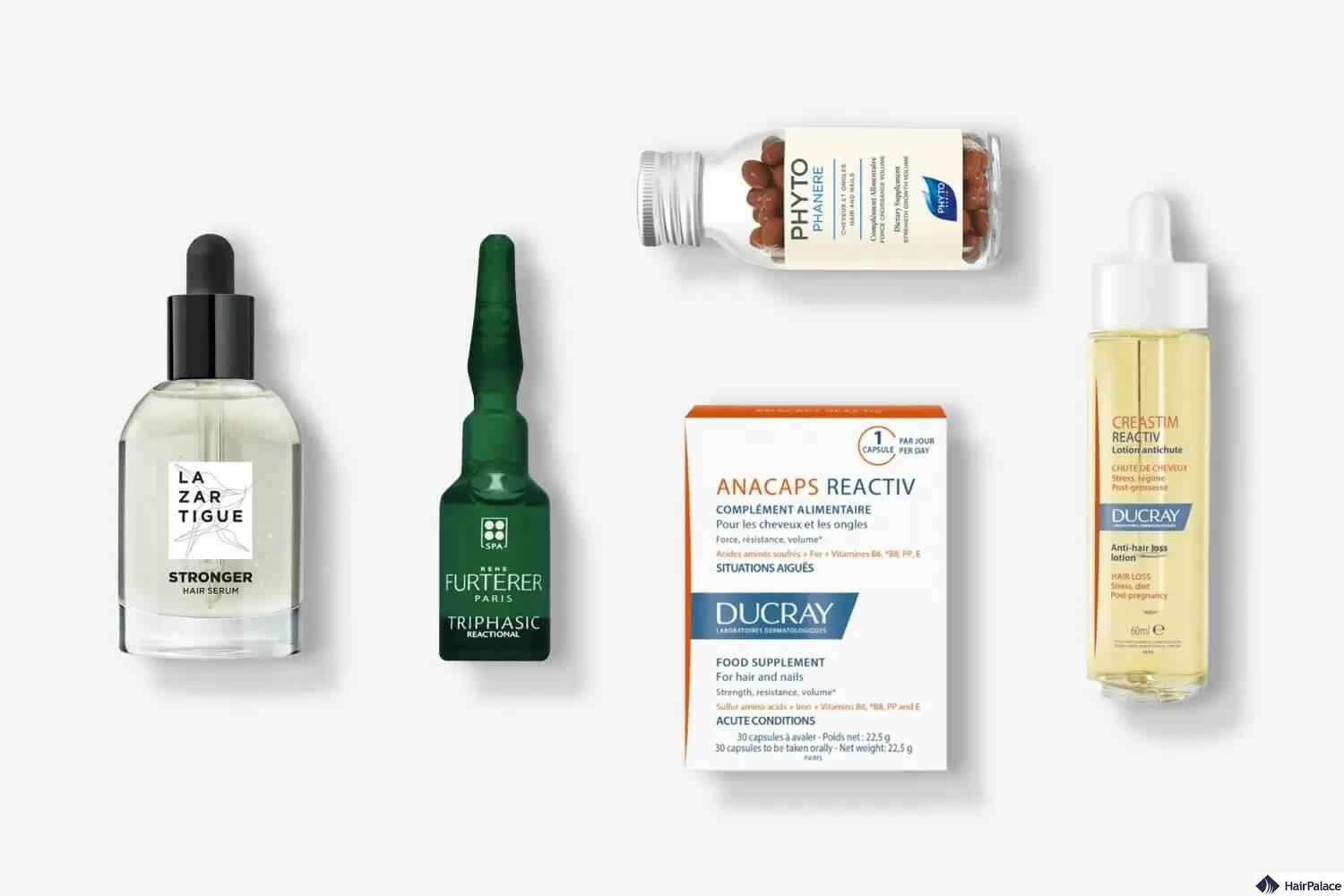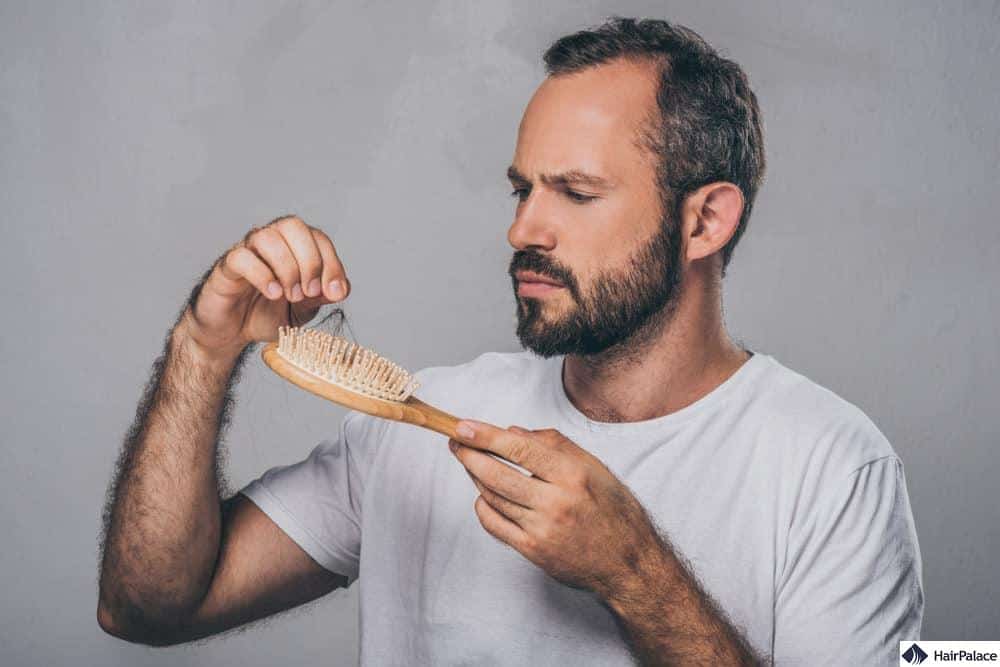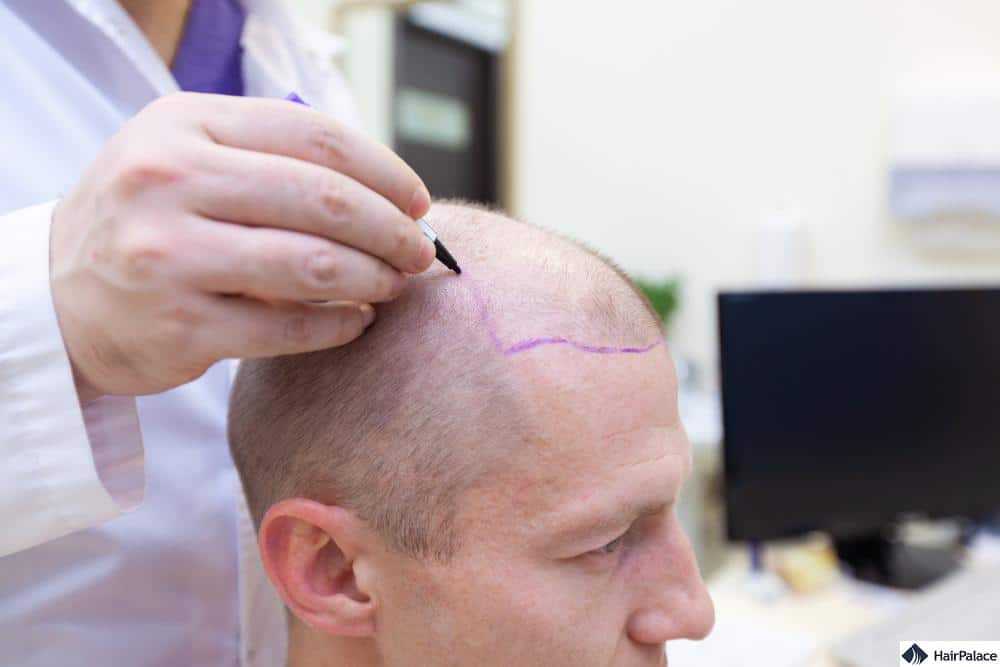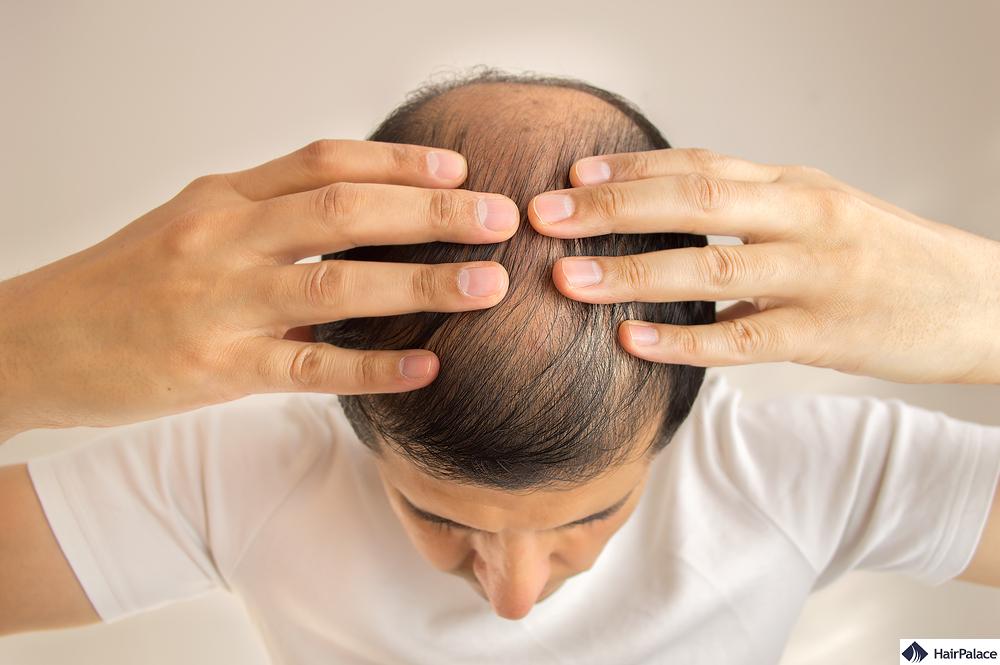Hair Loss Treatments: Top 15 Methods in 2025

The latest male hair loss treatments can restore hair growth with natural, seamless results.
Whether you’re suffering from hereditary hair loss or any other type, there are solutions available.
Still, it’s not always easy to know which treatment is right for you.
To help make your decision easier, we’ll explore the best options on the market below.
We’ll also offer detailed information on common causes and tips on how to prevent hair loss.
- What is male hair loss?
- Causes
- Medical treatments
- Natural remedies
- Complex therapies
- Lifestyle changes
- Prevention
- Ask a doctor
- Conclusion
What is hair loss in men?
It’s normal to lose around 50 to 100 hairs every day. Usually, this loss isn’t noticeable because new hair grows to replace the ones lost.
Hair loss and baldness occur when hair falls out too quickly, or new hairs stop growing.
Depending on the cause of hair loss, you may notice slow thinning or a sudden appearance of a bald patch. Additionally, it can impact just the hair on your scalp or entire body.
What causes hair loss in men?
To answer why my hair is falling out, we need to examine it from different perspectives.
Genetics is a leading cause of hair loss: men experiencing pattern baldness (also known as androgenetic alopecia) inherit hair highly sensitive to DHT.
This condition can manifest during puberty, twenties, thirties, or later.

Other common reasons for male hair loss include:
- hormonal changes
- infections of the scalp
- skin disorders
- Alopecia areata (patchy hair loss)
- medication
- stress
- radiation therapy
- harsh treatments or styles
- hair-pulling compulsion
A hair loss clinic can help you determine whether your thinning is due to a hereditary condition or a different issue.
Hair loss treatment for men
If you’re looking for the best male hair loss treatment in the UK, you have various options to choose from.
Medications, surgery, and non-invasive cosmetic treatments are available to promote new growth.
Medical treatments
Let’s take a closer look at each medical treatment:
- Finasteride: This prescription drug reduces DHT levels in the body and thus slows down, and in some cases even stops hair loss.
- Minoxidil (Rogaine): Minoxidil is an over-the-counter medication that causes the follicles to expand, which contributes to bigger hair density and increased hair growth.
- Hair restoration: This involves extracting healthy follicles from the back and sides of the scalp. The surgeon then inserts these back into the scalp’s thinning and balding zones to stimulate growth. The two most popular methods are FUT and FUE, with FUE being the most modern and efficient procedure.
- PRP treatment: Platelet-Rich Plasma therapy uses the patient’s blood to stimulate hair growth. Platelets are separated from the rest of the blood, and then injected into the bald areas leading to increased hair growth.
- LLT therapy: Laser treatment reduces the inflammation in hair follicles that prevents them from growing out in certain forms of hair loss, such as alopecia areata.

Natural hair loss treatment
- Oils
Some studies carried out on mice suggest that peppermint oil might be an effective treatment for hair loss.
Rosemary oil has also been proven to increase blood circulation in the scalp.
Coconut oil and olive oil are also recommended by some “experts”, but the efficacy of these oils is questionable at best.
- Saw palmetto
Saw palmetto is a palm that produces tiny berries.
Although research is limited, many believe that saw palmetto is the best natural hair loss treatment.
- Biotin
Biotin is a naturally occurring vitamin found in, nuts, sweet potatoes, onions, oats, and eggs.
Although there isn’t a whole lot to suggest that biotin slows down hair loss, it is never a bad idea to get more vitamins into your system.

- Onion juice
Minor studies showed that taking onion juice as a topical treatment leads to noticeable growth in people suffering from androgenetic alopecia.
However, more research is needed to come to a definitive conclusion.
- Bhringraj
Bhringraj (also referred to as false daisy) is known to support hair regrowth. Some studies have shown that extracts of the herb offer better results than Minoxidil.
However, more research is needed to confirm these findings.
- Green tea
Another widely used remedy for hair loss is green tea.
Green tea contains some polyphenolic compounds that act as a natural remedy against hair loss.
Although the effectiveness of these compounds is still somewhat unclear.
- Hibiscus
Hibiscus is widely marketed for its hair growth stimulating properties, but there are no studies to support these claims.
Hair loss therapies
You may consider a more holistic approach to decrease hair loss, incorporating a combination of shampoos, drugs, and other hair growth products.
A hair loss centre can create a treatment plan for you based on your condition, its probable causes, and your overall health.
Healthy lifestyle
A balanced diet may help keep your hair in tip-top shape.
Make sure you’re including a variety of vegetables, fruits, whole grains, unsaturated fats, and lean proteins in your diet.
Try to limit your intake of sweets.
Exercising regularly and reducing your stress levels may also help.
Wigs or hairpieces
Men may prefer to wear a wig or hairpiece instead of trying other hair loss options.
They’re a simple way to cover up thinning areas, whether it’s temporary or permanent.
The latest options are more convincing than ever, resembling natural hair.
How to prevent male pattern hair loss?
You may be able to prevent hair loss (or slow down further hair loss) in some cases, depending on the exact nature of your hair shedding and the reasons behind it.
While these tips might help you prevent or slow down your hair thinning, they likely won’t reverse hair loss or lead to a complete regrowth.
You can try the following techniques:
1. Have a balanced diet
Having a more balanced diet that gives your body a sufficient amount of proteins, vitamins, and minerals is essential in keeping your body healthy.
Vitamin deficiency can contribute to thinning hair, so it is best to make sure you get enough of them.
2. Handle your hair with care
In order to have healthy hair, you should avoid using any products that contain harsh chemicals, and refrain from wearing tight hairstyles that put unnecessary pressure on your roots.
You should consider switching to a wide-tooth comb for styling, as it doesn’t pull on your strands as much as traditional combs and thus causes less damage to your roots.
3. Reduce the amount of stress in your life
Stress can have a negative effect on various aspects of your life, including your hair.
You can try to reduce the amount of stress you’re exposed to by regularly exercising, listening to music, or meditating.
However, the easiest solution is simply getting enough sleep.
4. Scalp massages
Scalp massages not only feel wonderful but may also function as a baldness treatment.
Massaging your scalp stimulates blood flow in the region, and in turn, can encourage natural hair regrowth.

5. Contact a hair loss treatment clinic
Hair loss affects men in different ways. Some may accept their baldness easily.
Some might wear a wig to cover their thinning scalp each day.
And others will take action to restore growth, using one or more treatments.
A hair transplant is the best hair loss treatment for men available today, particularly the FUE technique.
HairPalace provides the most advanced form of this method, the FUE2, designed to achieve the most natural hair transplant results.
Seek hair loss consultation
While there is no hair loss cure, there are several treatments you can try to restore your hair.
These include OTC and prescription medication, hair implants, and home remedies.
Talk with your doctor first. Hair loss specialists can help you figure out what causes the thinning and what the best treatment option would be.
FAQ
Two popular medications for treating male pattern baldness are available. Minoxidil, most commonly sold as Rogaine, is an over-the-counter solution produced as a foam or liquid. Finasteride (sold as Proscar or Propecia) is an oral medication for daily consumption.
No cure is available for male pattern baldness at present. However, certain medications can slow its progression. Minoxidil is an over-the-counter option designed for direct application to the scalp. This reduces the rate of thinning and can promote new hair growth.
Hair loss treatments can work, but their effectiveness varies depending on the cause of hair loss, the type of treatment, and the individual’s response to the treatment.
Sertraline can cause hair loss, although it is a relatively rare side effect.
Anavar (oxandrolone) can cause hair loss, especially in individuals predisposed to male pattern baldness.
Wearing a cap does not typically cause hair loss. However, if the cap is very tight, it might contribute to a specific type of hair loss known as traction alopecia.
Hormone replacement therapy (HRT) can sometimes cause hair loss as a side effect, depending on the individual and the specific hormones used.
Smoking can contribute to hair loss, as it impairs blood flow to the scalp and damages hair follicles.
Excessive alcohol consumption can lead to hair loss by impacting nutrient and hormone levels, as well as liver function.
Depression can potentially lead to hair loss, primarily due to stress and changes in bodily functions it can cause.
Wearing a beanie does not generally cause hair loss. However, like any tight headwear, if worn excessively tight and frequently, it could potentially contribute to traction alopecia.
Washing your hair every day does not typically cause hair loss, but it can strip the hair of natural oils and potentially weaken it.
Creatine may increase DHT (dihydrotestosterone) levels, a hormone linked to male pattern baldness, potentially accelerating hair loss in those genetically predisposed.
Smoking restricts blood flow to hair follicles, reduces oxygen supply, and increases oxidative stress, all of which can contribute to weakened hair and premature shedding.
Tight or heavy hair extensions can cause traction alopecia, a type of hair loss resulting from prolonged tension on the hair follicles, leading to thinning and breakage.
Excessive consumption of energy drinks may contribute to hair loss by increasing stress hormones (cortisol), caffeine-induced dehydration, and reducing nutrient absorption needed for healthy hair growth.
A lack of vitamin B12 can lead to poor oxygen supply to hair follicles, weakening the hair structure and causing increased shedding and thinning over time.
Last medically reviewed on February 11th, 2025
- Randolph M, Tosti A. Oral minoxidil treatment for hair loss: A review of efficacy and safety. J Am Acad Dermatol. 2021 Mar;84(3):737-746. https://pubmed.ncbi.nlm.nih.gov/32622136/
- Lourith N, Kanlayavattanakul M. Hair loss and herbs for treatment. J Cosmet Dermatol. 2013 Sep;12(3):210-22. https://pubmed.ncbi.nlm.nih.gov/23992163/
- Vañó-Galván S, Camacho F. New Treatments for Hair Loss. Actas Dermosifiliogr. 2017 Apr;108(3):221-228. https://pubmed.ncbi.nlm.nih.gov/28061966/
- Avci P, Gupta GK, Clark J, Wikonkal N, Hamblin MR. Low-level laser (light) therapy (LLLT) for treatment of hair loss. Lasers Surg Med. 2014 Feb;46(2):144-51. https://pubmed.ncbi.nlm.nih.gov/23970445/
- DiMarco G, McMichael A. Hair Loss Myths. J Drugs Dermatol. 2017 Jul 1;16(7):690-694. https://pubmed.ncbi.nlm.nih.gov/28697221/
- Zhou C, Li X, Wang C, Zhang J. Alopecia Areata: an Update on Etiopathogenesis, Diagnosis, and Management. Clin Rev Allergy Immunol. 2021 Dec;61(3):403-423. https://pubmed.ncbi.nlm.nih.gov/34403083/
- Mirmirani P, Fu J. Diagnosis and Treatment of Nonscarring Hair Loss in Primary Care in 2021. JAMA. 2021 Mar 2;325(9):878-879. https://pubmed.ncbi.nlm.nih.gov/33651080/
- Banka N, Bunagan MJ, Shapiro J. Pattern hair loss in men: diagnosis and medical treatment. Dermatol Clin. 2013 Jan;31(1):129-40. https://pubmed.ncbi.nlm.nih.gov/23159182/
- Sattur, Sandeep S. A Review of Surgical Methods (Excluding Hair Transplantation) and Their Role in Hair Loss Management Today. Journal of Cutaneous and Aesthetic Surgery 4(2):p 89-97, May–Aug 2011. https://journals.lww.com/jcas/Fulltext/2011/04020/A_Review_of_Surgical_Methods__Excluding_Hair.2.aspx
- Gkini, Maria-Angeliki; Kouskoukis, Alexandros-Efstratios; Tripsianis, Gregory1; Rigopoulos, Dimitris2; Kouskoukis, Konstantinos. Study of Platelet-Rich Plasma Injections in the Treatment of Androgenetic Alopecia Through an One-Year Period. Journal of Cutaneous and Aesthetic Surgery 7(4):p 213-219, Oct–Dec 2014. https://journals.lww.com/jcas/Fulltext/2014/07040/Study_of_Platelet_Rich_Plasma_Injections_in_the.7.aspx


